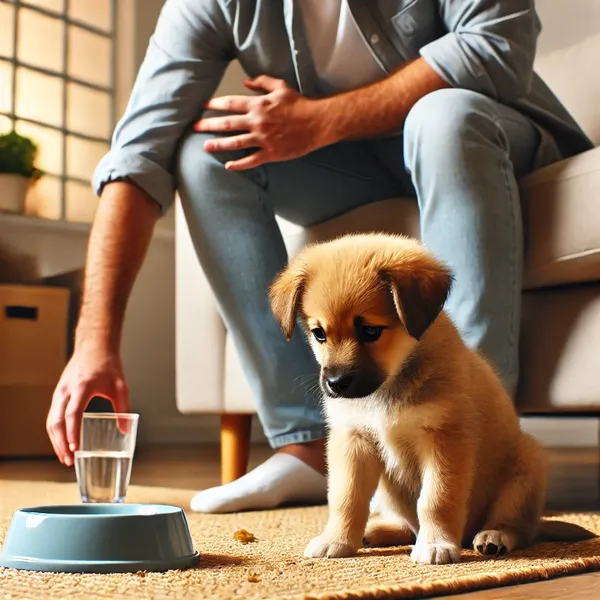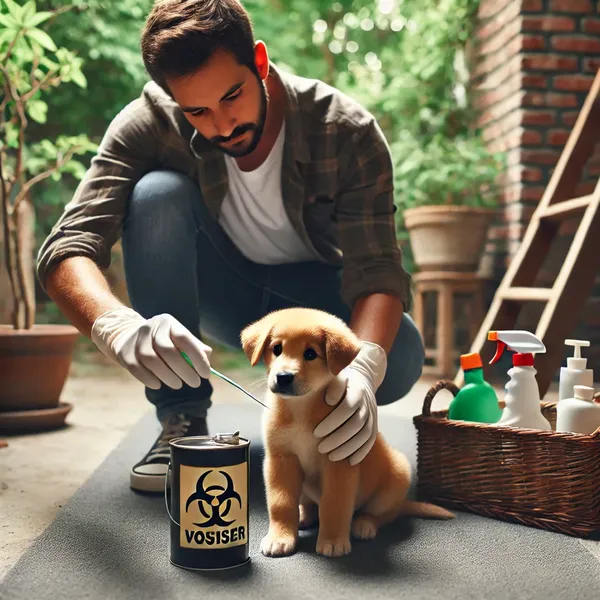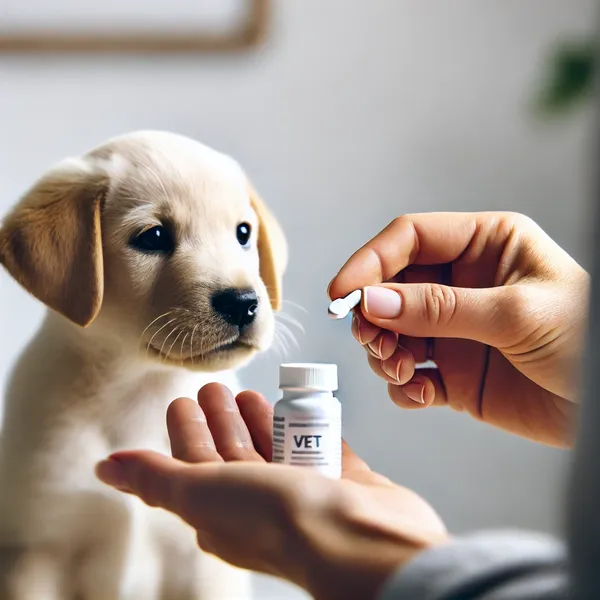What to do when your puppy Is vomiting? Observing your puppy retching and expelling its contents may be disturbing. Puppies are generally curious and sometimes consume items that they shouldn’t. Sometimes, however, retching may come as a concern. You need not worry! We will assist you in knowing what the problem may be and how you could help your little furry baby regain their well-being.
What to Do If Your Puppy Is Vomiting

1. Be Calm and Watch Your Puppy
The very first thought that you need to bear when your puppy does vomit is panic should be avoided. Puppies can easily tell when their owners are anxious, which may only aggravate the situation. Suck it up and pay attention to your puppy. Do they vomit one time and then act normally, or do they have repeated episodes of vomiting?
When one should seek help:
More than one episode of vomiting occurs over a short duration of time.
- Your puppy is clinically lethargic.
- There is blood present in the vomitus.
- Your puppy is currently refusing to eat or drink.
- The vomit presents as foamy bile or any strange colors like greenish black.
If your puppy displays any of the above warnings, contact the veterinarian.
2. Investigate Anything that Your Puppy Might Have Eaten
If your puppy vomits, why not consider what they have eaten lately?
Things that would commonly make puppies vomit include:
- Inedible things. They would love to chew on toys, shoes, or other items, small or big.
- Food from outside: like chocolate, onions, or even grapes, can be harmful.
- Geography: Certain vegetation is poisonous to dogs.
- Chemical substances: Cleaning detergents or anything like anti-freeze is harmful if consumed.
You would want to ensure the house is dog-safe so your little one does not access something harmful!
3. Assess the Severity of the Condition
Not all instances of vomiting require worrying. For instance, some puppies often have a simple case of indigestion. This could be caused by several factors, such as swallowing food too quickly or gulping excessive water after a play session. In such instances, vomiting is often an isolated event before the puppy resumes normal activity.
However, if vomiting persists, there may be a deeper underlying issue. Here are a few conditions to be aware of:
Possible causes of vomiting:
| Condition | Symptoms | What to Do |
| Gastroenteritis | Vomiting, diarrhea, fatigue | Visit the vet for treatment |
| Parvovirus | Severe vomiting, bloody diarrhea | Emergency vet visit required |
| Intestinal blockage | Vomiting, loss of appetite, pain | Surgery may be necessary |
| Pancreatitis | Vomiting, abdominal pain, lethargy | Requires medication and rest |
| Toxin ingestion | Vomiting, drooling, tremors | Immediate vet care needed |
If you develop any of these signs, do not hesitate to contact your veterinarian right away.
4. Allow For Stomach Rest
If the pup has thrown up but is persistently lively, you may comfort its stomach. Gorging on food or playing around too much is akin to no food or excessive activities out of rest. Thus, dogs also need to rest even after a sick stomach.
Here is how the tummy of your puppy can be rested:
- For twenty-four hours or so, completely take out the food. This allows the stomach to calm down.
- Provide small sips of water during this time. Puppies dehydrate very fast, so making sure they take in fluids is essential.
- After 12 hours, bland food such as boiled chicken and plain rice may be given in small portions.
- Slowly mix back the puppy’s usual food the next day or two.
If the puppy vomits again after eating, please check with a veterinarian.
5. Drink Plenty of Water
Hydrate! One of the most problematic issues regarding puppies regurgitating is that it can lead to severe dehydration.
These dogs are small, so their water content may be lost quickly. You will have to supervise your puppy and make sure it drinks some water.
However, do not allow it to drink water in one go. Sample water after a while so they do not throw up again.
Under such circumstances, you need to have the puppy checked by the vet.
6. Monitoring the Bowel Movements
Yes, it is not something you want to do, but looking at your puppy’s pooch condition can help you better understand his health.
For example, suppose the puppy is vomiting, has protruding eyes, and diarrhea with constipation. In that case, this pup is likely suffering from some virus-like gastroenteritis and parvovirus in a worst-case scenario.
The following are indicators of health challenges: Watch Thus Out Diarrhea but no vomiting and vomiting but no diarrhea, might be cases of sore throats.
Furthermore, any poop with blood in it is always a source of worry. If the stool is consistent after vomiting, it is safe to assume there is no infection and the stomach is upset.
When to Call the Veterinary Doctor

A veterinarian visit is unnecessary for every occurrence of vomiting, but there are warning signs that you should look out for that will make you want to call the vet without fail.
Please call your veterinarian if:
- Vomiting persists for over 24 hours.
- Your puppy whines or cries in distress.
- The vomitus features blood or odd colors.
- Your puppy abstains from drinking any water.
There is vomiting and other symptoms like tiredness or even a digestive upset.
In these cases, seeking help makes more sense than waiting it out.
Preventing Future Vomiting Episodes

After your puppy is well, Ways of avoiding vomiting include:
- Give more frequent but smaller portions. Young dogs tend to have small tummies and will vomit if offered too much food at once.
- Do not offer food from the table. Pet puppies can get food rich from the human diet and cause stomach upset.
- Supervise your puppy when eating and ensure it does not eat in a hurry. A special feeding bowl can also be provided.
Ensure your puppy is kept away from toxic chemicals or plants in the house.
Typical Ear Conditions in Puppies That Make Them Vomit
Puppies tend to vomit at or even at frequent intervals, mainly due to stomach problems. Knowing these facts is helpful because you can see why some happen.
Common Puppy Illnesses:
| Illness | Symptoms | Treatment |
| Worms | Vomiting, diarrhea, bloated belly | Deworming medication |
| Kennel Cough | Vomiting, coughing, sneezing | Antibiotics and rest |
| Food allergies | Vomiting after meals, itching | Switch to hypoallergenic food |
| Bacterial infections | Vomiting, diarrhea, fever | Antibiotics prescribed by vet |
Don’t Forget To Vaccine Your Fur Baby!
Keeping them updated is one of the most effective ways to protect your puppy from illnesses that can lead to vomiting, like parvovirus—vaccination schedule. Consult your vet regarding the vaccination timetable and ensure your puppy is given all the doses.
Avoid Giving Treats In Excessive Quantities
Puppies are adorable; we have all been guilty of spoiling and giving a treat once or twice. However, it dumplings their tummies often, ignoring this and giving them too much too frequently. Remember to use tiny ones and ensure that your pet is of the right age and suitable size for the ones used.
Know When Over The Counter Cures Should Be Applicable

Though a few over-the-counter drugs may cure your puppy’s upset stomach, you should always consult with your veterinarian first. Opposite what you want to achieve, giving your puppy the wrong drug could worsen the situation.
Remedies above (with permission from a vet):
- Pumpkin puree: Suitable for occasional mild digestive upset.
- Pedialyte: Electrolytes-enhanced fluid used for rehydration.
- Probiotics: These contain microorganisms that help ensure proper digestive system functioning.
Never administer any medication or supplementation to your puppy without consulting a veterinarian.
Trust Your Gut (and your veterinarian)
She is always around the puppy more than anyone, so she understands him well. When anything out of the ordinary is noted, there is no point in hesitation to ring the veterinarian.
It’s always better to err on the side of caution than to create a situation that one would wish didn’t occur concerning your puppy’s health.
At times, your puppy might not be throwing up, but he may still exhibit signs of discomfort or pain.
Observe their activity levels; for example, if they have been active for two days and stop or slow down significantly, a veterinarian should be contacted.
Shower Your Pets With Love and Affection
Lastly, your puppy also needs care and affection when ill. This can prevent them from becoming anxious or stressed due to their illness—a warm, quiet place to rest is helpful.
Puppies are like toddlers; they need more attention when sick. They need soothing, encouraging words and a few gentle tummy rubs as they recuperate to enhance the love and warmth that they have.
Conclusion
When a puppy is vomiting, it is all too understandable to panic. However, with proper measures in place, this need not be the case.
Relax, do not rush, especially if all you want to do is pick up the phone to call the vet. Moreover, remember to be warm and loving to your friends and allow them time for recovery.
Below, you are given measures to ensure that you. Help your puppy recover from postoperative colic and restore a cheerful, active attitude.
Now you understand how to act in a situation where your puppy is vomiting. Keep this guide close by, and do not be afraid to consider your puppy’s health. They are your responsibility, and with a little love and attention, you will be able to keep them healthy.